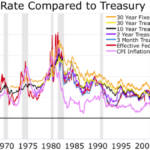Lawmakers weigh fiscal impact of extending tax reductions
- Republicans are debating whether to pay for extending the Trump-era tax cuts that expire after 2025.
- The question pits the party’s belief in tax cuts against concerns about federal debt and budget deficits.
- Some Republicans argue that tax-cut extensions are so important for growth that they don’t need to be fully paid for.
- Options being explored include repealing electric-vehicle tax breaks or reducing federal spending.
- The ultimate decision will depend on whether Republicans have congressional majorities next year.
Republicans are currently debating whether they should pay for extending the Trump-era tax cuts that are set to expire after 2025. This debate highlights the tension between the party’s belief in the economic benefits of tax cuts and concerns about federal debt and budget deficits. Some Republicans argue that the tax-cut extensions are crucial for strong economic growth and therefore do not need to be fully paid for. Various options are being explored to reduce the net cost of the tax-cut extension, such as repealing electric-vehicle tax breaks or cutting federal spending. The final decision will depend on whether Republicans have congressional majorities next year. If they do, they will have control over the fate of the tax cuts.·
Factuality Level: 3
Factuality Justification: The article provides a detailed and informative analysis of the debate among Republicans regarding the extension of Trump-era tax cuts. It presents various viewpoints and arguments from Republican lawmakers, former President Trump, and President Biden. The article also discusses the potential impact of extending the tax cuts on the economy and federal budget. However, the article lacks diversity in sources and perspectives, focusing primarily on Republican viewpoints and not providing a balanced view with input from Democrats or independent experts. Additionally, the article contains some speculative statements and predictions about future events, which may not be entirely factual.·
Noise Level: 3
Noise Justification: The article provides a detailed analysis of the debate among Republicans regarding the extension of Trump-era tax cuts. It explores different perspectives within the party, the potential costs, and the implications of various decisions. The article is focused, supported by evidence, and offers insights into the upcoming tax debate.·
Key People: Donald Trump (Former President), David Schweikert (Representative, R., Ariz.), Blake Moore (Representative, R., Utah), Jason Smith (Chairman of the House Ways and Means Committee, Representative, R., Mo.), Jon Traub (Former House GOP tax aide, Deloitte), Suzan DelBene (Representative, D., Wash.), Phillip Swagel (Director of the Congressional Budget Office), John Barrasso (Senator, R., Wyo.), Preston Brashers (Research Fellow, Heritage Foundation)
Financial Relevance: Yes
Financial Markets Impacted: The article discusses the debate among Republicans about extending the Trump-era tax cuts and how to cover the cost. This has implications for financial markets as it could impact government revenue, budget deficits, and economic growth.
Financial Rating Justification: The article specifically mentions the economic power of tax cuts, concerns about federal debt and budget deficits, and the potential impact on revenue and economic growth. These are all financial topics that are relevant to financial markets and companies.·
Presence Of Extreme Event: No
Nature Of Extreme Event: No
Impact Rating Of The Extreme Event: No
Extreme Rating Justification: ·
 www.wsj.com
www.wsj.com 





